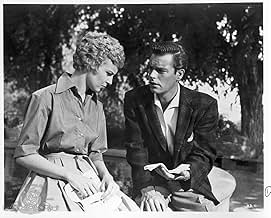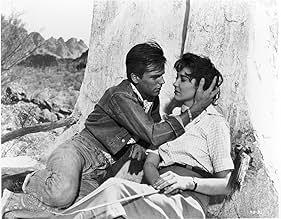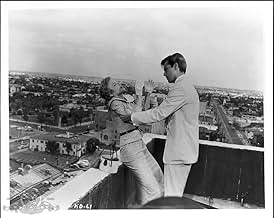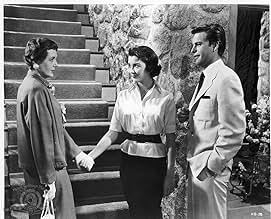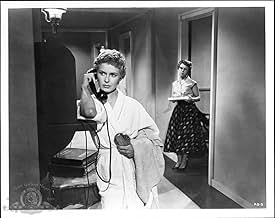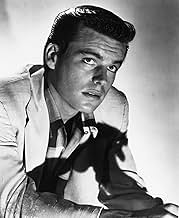NOTE IMDb
6,7/10
4,8 k
MA NOTE
Ajouter une intrigue dans votre langueA ruthless college student resorts to murder in an attempt to marry an heiress.A ruthless college student resorts to murder in an attempt to marry an heiress.A ruthless college student resorts to murder in an attempt to marry an heiress.
- Réalisation
- Scénario
- Casting principal
Albert Cavens
- Restaurant Patron
- (non crédité)
Robert Ivers
- Student at Murder Scene
- (non crédité)
Mickey Martin
- Student
- (non crédité)
Joe McGuinn
- Chemistry Professor
- (non crédité)
Edwin Rochelle
- Restaurant Patron
- (non crédité)
Jack Stoney
- Policeman
- (non crédité)
Avis à la une
I read Ira Levin's book when I was young, sometime in the 1960s, and loved it. It's very chilling, and I think as good as Rosemary's Baby. Better than the Stepford Wives and Boys from Brazil.
This film is a quite bizarre mixture of the chilling and the comical. Someone above has mentioned the scene where Bud and Dorie are having an intense conversation when suddenly a middle-aged woman in a completely see-through blouse with a great big bra underneath walks between them and halts the conversation; she has nothing whatsoever to do with the plot, and when it happened I literally burst out laughing at the incongruousness of it. I also laughed at Jeffrey Hunter's ridiculous attempts to manipulate heavy Clark Kent spectacles and an unlit pipe in a vain attempt to appear mature.
The good points about the film are the plot, which is gripping even though it's been shortened markedly from the book, and some of the acting, particularly Robert Wagner and Joanne Woodward -- and I also enjoyed George Macready as the father of Dorie and Ellen.
The fact is that I was consistently interested or amused or gripped by something or other for the whole of the film. You can't really ask for much more from a film.
This film is a quite bizarre mixture of the chilling and the comical. Someone above has mentioned the scene where Bud and Dorie are having an intense conversation when suddenly a middle-aged woman in a completely see-through blouse with a great big bra underneath walks between them and halts the conversation; she has nothing whatsoever to do with the plot, and when it happened I literally burst out laughing at the incongruousness of it. I also laughed at Jeffrey Hunter's ridiculous attempts to manipulate heavy Clark Kent spectacles and an unlit pipe in a vain attempt to appear mature.
The good points about the film are the plot, which is gripping even though it's been shortened markedly from the book, and some of the acting, particularly Robert Wagner and Joanne Woodward -- and I also enjoyed George Macready as the father of Dorie and Ellen.
The fact is that I was consistently interested or amused or gripped by something or other for the whole of the film. You can't really ask for much more from a film.
Bud Corliss (Robert Wagner) comforts his girlfriend Dorothy "Dory" Kingship (Joanne Woodward) who is utterly distraught after discovering her pregnancy. He's the gold digger and concerned only about her father's mining fortune. Her disinheritance is guaranteed and he is pushed to marry her. He plans to stage her suicide to get rid of both of his responsibilities. Dory has a sister in Ellen (Virginia Leith) and nobody in the family has ever met Bud.
It's an interesting noir story of the 50's. The Kingship family is the new wealth of the country while Bud represents the growing greed. He is the maniac pushed over the cliff. Robert Wagner has the leading man looks and he reminds me of Charlie Sheen if he turned fully to the dark side of Gordon Gekko. If there is a weakness in the movie, it's Ellen. She needs to be a younger sister rather than an older sister. She needs to be more innocent than Dory. That would elevate the danger and her innocence would allow better for his deception. Also, I don't see any great acting from Leith. The movie gets handed to her after the turn and she doesn't have the big screen power. She has a good look but she never took over. Overall, I love the story and the early execution is great. Wagner does really good work here.
It's an interesting noir story of the 50's. The Kingship family is the new wealth of the country while Bud represents the growing greed. He is the maniac pushed over the cliff. Robert Wagner has the leading man looks and he reminds me of Charlie Sheen if he turned fully to the dark side of Gordon Gekko. If there is a weakness in the movie, it's Ellen. She needs to be a younger sister rather than an older sister. She needs to be more innocent than Dory. That would elevate the danger and her innocence would allow better for his deception. Also, I don't see any great acting from Leith. The movie gets handed to her after the turn and she doesn't have the big screen power. She has a good look but she never took over. Overall, I love the story and the early execution is great. Wagner does really good work here.
He may not have been James Dean, but Robert Wagner delivers a career performance in this sorely neglected sleeper from 1956. The first half is a beautifully shaded dance of death as Wagner plots to rid himself of the inconveniently pregnant Joanne Woodward. He's all sincere insincerity from one rendezvous to the next, while she wants desperately to believe, even against all odds. Has there ever been a more cold-hearted manipulator of vulnerable feminine desires. Dory (Woodward) is all whiney expectations, while Wagner conceals ruthless ambition behind a pretty boy mask.
Director Gerd Oswald's staging of the first half is little short of brilliant, and had the filming been in appropriate black and white, a latter day noir classic would have resulted. Notice how subtly Woodward expects to be kissed atop the municipal building, the pinnacle of her girlish dreams, while Bud (Wagner) callously lights a cigarette, defiant of normal expectations. And what a gripping piece of morbid psychopathology is Wagner's slip-sliding through the chemistry lab as he prepares a toxic.potion for his lady love. Maybe in the last analysis, Bud's problem lies with his mother. The fixation is certainly not normal, as she senses in putting off his request for a "date". Yet Bud's social climbing ambitions are made tellingly clear that they are for mom as well as for himself.
Unfortunately, the second half reverts to standard Hollywood convention, the suspense subsiding along with the first-rate mood music. Putting a pipe in the callow Jeffrey Hunter's mouth and making him a college professor amounts to a crippling miscalculation on someone's part. Hunter's simply not the type, nor does he have the gravitas to carry the plot forward. The end result is a hybrid of first-half brilliance and second-half mediocrity. Too bad. The ending is appropriate, however, as the monster truck bears down like the hand of pre-destination that Bud should have taken note of in that literature class. There is a point to Dory's unfortunate life, after all.
Director Gerd Oswald's staging of the first half is little short of brilliant, and had the filming been in appropriate black and white, a latter day noir classic would have resulted. Notice how subtly Woodward expects to be kissed atop the municipal building, the pinnacle of her girlish dreams, while Bud (Wagner) callously lights a cigarette, defiant of normal expectations. And what a gripping piece of morbid psychopathology is Wagner's slip-sliding through the chemistry lab as he prepares a toxic.potion for his lady love. Maybe in the last analysis, Bud's problem lies with his mother. The fixation is certainly not normal, as she senses in putting off his request for a "date". Yet Bud's social climbing ambitions are made tellingly clear that they are for mom as well as for himself.
Unfortunately, the second half reverts to standard Hollywood convention, the suspense subsiding along with the first-rate mood music. Putting a pipe in the callow Jeffrey Hunter's mouth and making him a college professor amounts to a crippling miscalculation on someone's part. Hunter's simply not the type, nor does he have the gravitas to carry the plot forward. The end result is a hybrid of first-half brilliance and second-half mediocrity. Too bad. The ending is appropriate, however, as the monster truck bears down like the hand of pre-destination that Bud should have taken note of in that literature class. There is a point to Dory's unfortunate life, after all.
Set against the backdrop of the shiny 1950s, "A Kiss Before Dying" is a taunt thriller that can arguably be voted the predecessor of many modern thrillers.
When the film starts, it looks like a glamorous, teenybopper flick. The opening song compliments this heavily, as does the numerous logos and neon colours used in the opening credits. Thinking back on it now, I find it to be a very unusual, brilliant style of film-making that isn't seen very often. It tricks the viewer into something it is not. It is not a 1950s college comedy, but a relentless thriller with lots of unexpected twists and turns. I thought this movie was going to be tame, being a 1950s film and all, but I was pleasantly surprised in how raw the plot was in some places.
A young Robert Wagner portrays Bud Corliss, a darkly handsome college student with an obsessive taste for riches and fine dining. Bud is a trouble 25 year-old man who still lives at home with his aging widowed mother (Mary Astor). He feels unfulfilled in his life and a little uncertain about his future. Dorothy Kingship (Joanne Woodward), a girl with whom he is having a secret relationship with, may be the only glimmer of hope that will lift him up out of his bland, disappointing life. Dorothy's father is incredibly wealthy, and Bud knows this. However, Dorie falls pregnant and Bud is threatened with disinheritance and the inevitable prospect of working as a gas station attendant in order to pay the bills for his wife a baby. This is where the film really takes off and we get to see how dark, desperate and evil Bud really is.
Bud devises a plan: stage his girlfriends suicide. The plan seems simple enough and actually works in Bud's favour. He is free of Dorie and the prospect of disinheritance, and is now able to court Dorie's older sister, Ellen (Virginia Leith), who is totally oblivious of the fact that Bud is Dorie's old flame (and murderer). Enter rookie detective Gordon Grant (Jeffrey Hunter), an intelligent young man who questions the circumstances surrounding Dorie's death, as well as the integrity of Ellen's new lover, Bud. He just has to put the gruesome pieces together to solve the complex puzzle of deceit and murder.
I recommend this movie to fans of the thriller genre, as well as those who want to take a trip down memory lane. Great film with top performance by all. Kudos to Jeffrey Hunter.
When the film starts, it looks like a glamorous, teenybopper flick. The opening song compliments this heavily, as does the numerous logos and neon colours used in the opening credits. Thinking back on it now, I find it to be a very unusual, brilliant style of film-making that isn't seen very often. It tricks the viewer into something it is not. It is not a 1950s college comedy, but a relentless thriller with lots of unexpected twists and turns. I thought this movie was going to be tame, being a 1950s film and all, but I was pleasantly surprised in how raw the plot was in some places.
A young Robert Wagner portrays Bud Corliss, a darkly handsome college student with an obsessive taste for riches and fine dining. Bud is a trouble 25 year-old man who still lives at home with his aging widowed mother (Mary Astor). He feels unfulfilled in his life and a little uncertain about his future. Dorothy Kingship (Joanne Woodward), a girl with whom he is having a secret relationship with, may be the only glimmer of hope that will lift him up out of his bland, disappointing life. Dorothy's father is incredibly wealthy, and Bud knows this. However, Dorie falls pregnant and Bud is threatened with disinheritance and the inevitable prospect of working as a gas station attendant in order to pay the bills for his wife a baby. This is where the film really takes off and we get to see how dark, desperate and evil Bud really is.
Bud devises a plan: stage his girlfriends suicide. The plan seems simple enough and actually works in Bud's favour. He is free of Dorie and the prospect of disinheritance, and is now able to court Dorie's older sister, Ellen (Virginia Leith), who is totally oblivious of the fact that Bud is Dorie's old flame (and murderer). Enter rookie detective Gordon Grant (Jeffrey Hunter), an intelligent young man who questions the circumstances surrounding Dorie's death, as well as the integrity of Ellen's new lover, Bud. He just has to put the gruesome pieces together to solve the complex puzzle of deceit and murder.
I recommend this movie to fans of the thriller genre, as well as those who want to take a trip down memory lane. Great film with top performance by all. Kudos to Jeffrey Hunter.
An evil young man resorts to murder in his efforts to get his hands on an heiress's fortune. Unluckily for him, the heiress's sister and a smart young college lecturer smell a rat ...
This is a sumptuous mid-50's all-American movie, set in a world of sorority houses, open-top cars and drug stores. The boys have shiny, well-oiled hair and the girls wear big skirts. Courting couples meet on the bleachers at the football field between classes.
Shot in cinemascope, the film's aspect ratio means that television (where I saw it) does it a disservice: all too often, dialogues are conducted between two noses at either extreme of the screen. The colour is 'de luxe', so the credits tell us, and indeed the look of the film is rich and bright.
The film is a standard thriller, based on an Ira Levin novel. It is well put together, and has a nice, slinky jazz score, including the theme song (playing on the juke box during one of Bud's dates with Dory).
The opening is impressive. The camera pans around a student's bedroom, neatly setting the scene for us. We hear (but do not see) a girl crying. Gradually, as the characters are revealed, we get the message - Dory has found out that she is pregnant by Bud. She has a wealthy father, but is prepared to forego comfort if the man she loves will marry her. Bud is much more interested in the family money.
Even though Bud is despicable, we find ourselves wanting his scheme to succeed, so cleverly are we drawn into his plan. He surreptitiously studies poisons in the university library, then by a cunning ploy gains access to the chemistry lab. He composes a note in Spanish, ostensibly a piece he needs to translate for his class, then gets Dory to write out the English for him. She doesn't realise it, but she is writing her own 'suicide note'. Gerd Oswald's direction is strong on body language throughout the movie, and we cannot help but see the significance when Dory (played by Joanne Woodward) goes to kiss Bud, and he flinches.
A very young Robert Wagner portrays Bud as a slick, incredibly handsome villain with no feelings. He feigns affection for women, but is capable of none. When he cajoles his mother (Mary Astor) into choosing a tie for him, he craftily changes it for a preferred one when her back is turned.
The director is adept at conveying information without words. When Bud looks at the municipal building and marvels at its height, we know straight away what he is planning. When he is on the roof, the tension is sustained commendably.
Victoria Leith plays Ellen, Dory's sister. In another fine 'body language' moment, we see her subtly shrugging off her father's attempt to comfort her. We gather from this that Ellen blames him for what happened to Dory.
The plot contains some elements which stretch our credulity. If the ending is contrived and highly improbable, at least the incremental steps by which doubt invades Ellen's awareness are cleverly done.
Is it a coincidence that Jeff Hunter (Gordon Grant) and Robert Wagner look so alike? Or are they meant to represent two facets of intelligence - one cold and selfish, the other beneficent and altruistic? In the scene just before the engagement party, they are even dressed identically.
Verdict - A cleverly-executed murder flick.
This is a sumptuous mid-50's all-American movie, set in a world of sorority houses, open-top cars and drug stores. The boys have shiny, well-oiled hair and the girls wear big skirts. Courting couples meet on the bleachers at the football field between classes.
Shot in cinemascope, the film's aspect ratio means that television (where I saw it) does it a disservice: all too often, dialogues are conducted between two noses at either extreme of the screen. The colour is 'de luxe', so the credits tell us, and indeed the look of the film is rich and bright.
The film is a standard thriller, based on an Ira Levin novel. It is well put together, and has a nice, slinky jazz score, including the theme song (playing on the juke box during one of Bud's dates with Dory).
The opening is impressive. The camera pans around a student's bedroom, neatly setting the scene for us. We hear (but do not see) a girl crying. Gradually, as the characters are revealed, we get the message - Dory has found out that she is pregnant by Bud. She has a wealthy father, but is prepared to forego comfort if the man she loves will marry her. Bud is much more interested in the family money.
Even though Bud is despicable, we find ourselves wanting his scheme to succeed, so cleverly are we drawn into his plan. He surreptitiously studies poisons in the university library, then by a cunning ploy gains access to the chemistry lab. He composes a note in Spanish, ostensibly a piece he needs to translate for his class, then gets Dory to write out the English for him. She doesn't realise it, but she is writing her own 'suicide note'. Gerd Oswald's direction is strong on body language throughout the movie, and we cannot help but see the significance when Dory (played by Joanne Woodward) goes to kiss Bud, and he flinches.
A very young Robert Wagner portrays Bud as a slick, incredibly handsome villain with no feelings. He feigns affection for women, but is capable of none. When he cajoles his mother (Mary Astor) into choosing a tie for him, he craftily changes it for a preferred one when her back is turned.
The director is adept at conveying information without words. When Bud looks at the municipal building and marvels at its height, we know straight away what he is planning. When he is on the roof, the tension is sustained commendably.
Victoria Leith plays Ellen, Dory's sister. In another fine 'body language' moment, we see her subtly shrugging off her father's attempt to comfort her. We gather from this that Ellen blames him for what happened to Dory.
The plot contains some elements which stretch our credulity. If the ending is contrived and highly improbable, at least the incremental steps by which doubt invades Ellen's awareness are cleverly done.
Is it a coincidence that Jeff Hunter (Gordon Grant) and Robert Wagner look so alike? Or are they meant to represent two facets of intelligence - one cold and selfish, the other beneficent and altruistic? In the scene just before the engagement party, they are even dressed identically.
Verdict - A cleverly-executed murder flick.
Le saviez-vous
- AnecdotesThe producers had to fight the Production Code office, or what was left of it by this time, to get the word "pregnant" into the film. Even then, the word was deleted in some parts of the country by local censors. The novel was further bowdlerized by having no discussion in the film between Bud and Dorothy about the possibility of her having an abortion, and the pills Bud gives her are said by him to be vitamins and are in fact simply poison to kill her - whereas in the novel they are intended to induce a termination of pregnancy.
- GaffesNear the end, Gordon is riding to the mine in a Cadillac limousine that has air conditioning, as indicated by small air scoops on both sides behind the back doors. The next shots (after the accident) show a different Cadillac without them. Cars of this era with factory installed air conditioning had half of the system in the trunk, requiring outside air via those little air scoops.
- Citations
Bud Corliss: It's not right.
Dorothy Kingship: What?
Bud Corliss: For anyone to love somebody as much as I love you.
- ConnexionsReferenced in Living Single: A Kiss Before Lying (1993)
Meilleurs choix
Connectez-vous pour évaluer et suivre la liste de favoris afin de recevoir des recommandations personnalisées
Détails
- Durée
- 1h 34min(94 min)
- Couleur
- Rapport de forme
- 2.35 : 1
Contribuer à cette page
Suggérer une modification ou ajouter du contenu manquant


